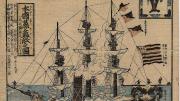A Houghton Library exhibition offers a selection of objects highlighting Chinese, Japanese, and Korean Holdings at Yenching and Houghton Libraries (September 5-December 19). They include a Japanese scroll depicting Commodore Perry’s 1853 invasion of Japan, a first edition of Mao Tse-tung’s “Little Red Book,” and a sixteenth-century volume from Yongle da dian, “the world’s largest known encyclopedia until the creation of Wikipedia,” say curators. They’ve also featured poems from Kunhua Ge, Harvard’s first Chinese language instructor. He arrived in Boston in 1879 with his wife and children—and with the books that spawned the Harvard-Yenching Library’s current million-volume East Asian language materials collection, the largest in any academic library outside of East Asia. The Houghton exhibit, the first such collaboration with the Yenching, is meant to showcase the breadth and depth of materials available. Among other planned events, Bard College associate professor of Japanese Nathan Shockey, author of The Typographic Imagination: Reading and Writing in Japan’s Age of Modern Print Media (2020), lectures on his research and aspects of the collection on October 11.
Speaking Volumes
Speaking Volumes
Glimpsing Harvard’s East Asian language materials collection

Click on arrow at right to view full image
Scroll depicting Commodore Perry’s 1853 invasion of Japan (click on arrow at right to view full image)Image courtesy of the Harvard-Yenching Library
You might also like
Yesterday’s News
How a book on fighting the “Devill World” survived Harvard’s historic fire.
Bees and Flowers Are Falling Out of Sync
Scientists are revisiting an old way of thinking about extinction.
Mount Vernon, Historic Preservation, and American Politics
Anne Neal Petri promotes George Washington and historic literacy.
Most popular
Explore More From Current Issue

Rabbi, Drag Queen, Film Star
Sabbath Queen, a new documentary, follows one man’s quest to make Judaism more expansive.

How a Harvard Hockey Legend Became a Needlepoint Artist
Joe Bertagna’s retirement project recreates figures from Boston sports history.

Inside Harvard’s Most Egalitarian School
The Extension School is open to everyone. Expect to work—hard.





